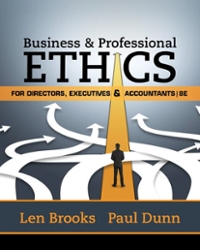In January 2006, the chair of Hewlett- Packard (HP), Patricia Dunn, hired a team of independent electronic-security
Question:
In January 2006, the chair of Hewlett-
Packard (HP), Patricia Dunn, hired a team of independent electronic-security experts to determine the source of leaked confidential details regarding HP’s longterm strategy. In September 2006, the press revealed that the independent experts spied on HP board members and several journalists. They obtained phone call records of HP board members and nine journalists, including reporters for CNET, the New York Times, and the Wall Street Journal, using an unethical and possibly illegal practice known as pretexting. Patricia Dunn claimed she did not know the methods the investigators used to determine the source of the leak but resigned after the scandal. Ten days earlier, George Keyworth, the director responsible for the leak, had resigned from HP’s board after twenty-one years of service.
HP, founded in 1939, operates in more than 170 countries and is the world’s largest seller of personal computers, offering a wide range of products and services, such as digital photography, digital entertainment, computing, and home printing. In addition, HP provides infrastructure and business offerings that span from handheld devices to some of the world’s most powerful supercomputer installations. HP is among the world’s largest IT companies, with revenue totaling \($107.7\) billion for the four fiscal quarters ended January 31, 2008. In 2007, HP was ranked 14th in the Forbes 500 list. The company’s corporate headquarters is in Palo Alto, California. Patricia Dunn joined HP’s board in 1998, and was elected nonexecutive chair in February 2005. She was CEO of Barclays Global Investors from 1995 to 2002. In January 2006, the online technology site CNET published an article about the long-term strategy at HP. The article quoted an anonymous source inside HP and contained information known only by the company’s directors. Following the CNET article, Dunn, with the assistance of HP security personnel and the company’s counsel’s office, authorized a team of independent electronic-security experts to investigate the origin of the leak. The investigation targeted the January 2006 communications of HP’s directors, including not only the records of phone calls and e-mails from HP but also the records from their personal accounts.........
Questions:-
1. Should the chair of the board of directors be allowed to initiate investigations into weaknesses in a company’s internal control system?
2. Is the strategy of pretexting an acceptable means in order to obtain critical information that will strengthen a company’s internal control system?
The following legal advice was obtained on the subject by HP:
The committee was then advised by the committee’s outside counsel that the use of pretexting at the time of the investigation was not generally unlawful (except with respect to financial institutions), but such counsel could not confirm that the techniques employed by the outside consulting firm and the party retained by that firm complied in all respects with applicable law.1 3. Should the reasons for resignations from a board of directors always be made public?
Step by Step Answer:

Business And Professional Ethics
ISBN: 9781337514460
8th Edition
Authors: Leonard J Brooks, Paul Dunn





